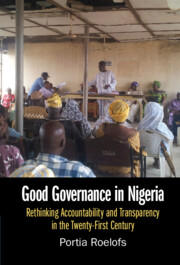Book contents
- Good Governance in Nigeria
- Good Governance in Nigeria
- Copyright page
- Dedication
- Epigraph
- Contents
- Figures
- Tables
- Acknowledgements
- Abbreviations
- Major Characters
- Map of Nigeria
- Additional material
- Introduction
- 1 Contested Legacies of Good Governance
- 2 Good Governance, What’s Not to Love?
- 3 Be Accessible! Accountability, Performance and the Politician Who Is ‘Always in a Meeting’
- 4 Theorising Accountability as Accessibility
- 5 Transparency in People
- 6 Socially Embedded Good Governance
- Conclusion
- Appendix: Methods and Methodology
- Glossary of Yoruba Terms
- Select Bibliography
- Index
6 - Socially Embedded Good Governance
The Public–Private Divide, Out-of-Office Politicians and ‘Personal’ Politics in Africa
Published online by Cambridge University Press: 13 April 2023
- Good Governance in Nigeria
- Good Governance in Nigeria
- Copyright page
- Dedication
- Epigraph
- Contents
- Figures
- Tables
- Acknowledgements
- Abbreviations
- Major Characters
- Map of Nigeria
- Additional material
- Introduction
- 1 Contested Legacies of Good Governance
- 2 Good Governance, What’s Not to Love?
- 3 Be Accessible! Accountability, Performance and the Politician Who Is ‘Always in a Meeting’
- 4 Theorising Accountability as Accessibility
- 5 Transparency in People
- 6 Socially Embedded Good Governance
- Conclusion
- Appendix: Methods and Methodology
- Glossary of Yoruba Terms
- Select Bibliography
- Index
Summary
This chapter offers a theoretical account of socially embedded good governance. It connects the two major principles discussed in the book so far – accountability as accessibility and transparency in people – to the idea of a public–private divide and debates around good governance and corruption in Africa more broadly. Specifically, the public–private divide is written into principal–agent models of democratic accountability and forms the crux of liberal definitions of corruption. Popular conceptions of socially embedded good governance hold that the connections that make powerful people knowable and accessible in ordinary life should not be severed as they enter the public office. This requires expanding the scope of good governance beyond the formal realm of the state. The chapter repurposes Peter Ekeh’s idea of the ‘two publics’ to suggest that popular demands for transparency in people and accountability as accessibility could be understood as a demand to re-connect the social with the political and thus unite the ‘two publics’. It concludes that not only is “personal politics without clientelism” (Mueller 2018) possible but also the porousness of the state to social relations – for so long seen as the Achilles heel of governance in Nigeria - may in fact be its strength.
Keywords
- Type
- Chapter
- Information
- Good Governance in NigeriaRethinking Accountability and Transparency in the Twenty-First Century, pp. 234 - 261Publisher: Cambridge University PressPrint publication year: 2023



